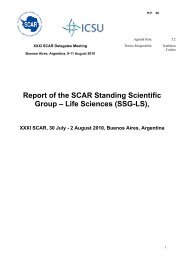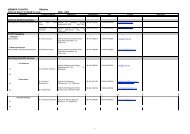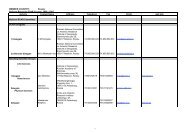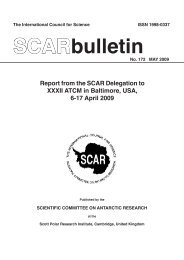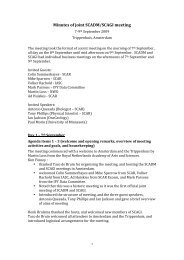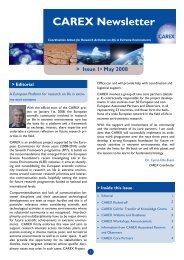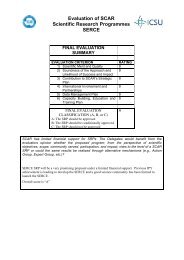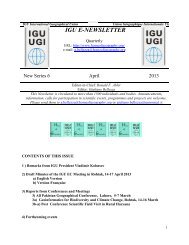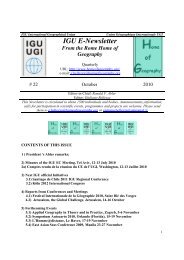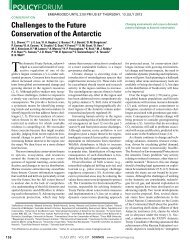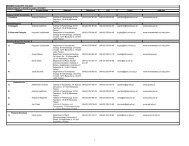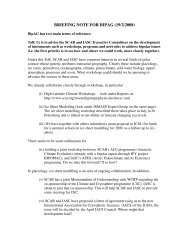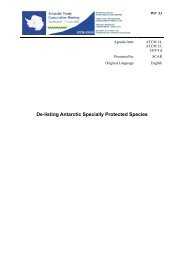SCAR Action Group History of Antarctic Research 1
SCAR Action Group History of Antarctic Research 1
SCAR Action Group History of Antarctic Research 1
Create successful ePaper yourself
Turn your PDF publications into a flip-book with our unique Google optimized e-Paper software.
Karl Maria Herrligk<strong>of</strong>fer’s private „German South Pole Expedition“<br />
1957/58 – A failed initiative<br />
Cornelia Lüdecke, C.Luedecke@lrz.uni-muenchen.de<br />
Centre for the <strong>History</strong> <strong>of</strong> Science, Mathematics and Technology, University <strong>of</strong><br />
Hamburg, Hamburg, Germany<br />
In January 1953, during the planning <strong>of</strong> the International Geophysical Year (IGY, 1957-<br />
1958) a German Journal addressed arguments about the South Pole and the political<br />
interests in <strong>Antarctic</strong>a. It also described possible German territorial claims, which were<br />
introduced by three expeditions. These claims were seen as very important in respect to<br />
whaling and the global fat production. This might have influenced the medical doctor<br />
and specialist <strong>of</strong> anatomy Karl Maria Herrligk<strong>of</strong>fer (1916-1991), who was just organising<br />
the first successful expedition to the top <strong>of</strong> Nanga Parbat (8125 m) in the same year.<br />
In 1955 he founded a committee consisting <strong>of</strong> politicians and scientists to support his<br />
plan <strong>of</strong> a new German South Pole Expedition. He also could interest expedition members<br />
<strong>of</strong> the last (3 rd ) German <strong>Antarctic</strong> expedition (1938/39) to Neuschwabenland under<br />
the leadership <strong>of</strong> Alfred Ritscher (1879-1963). Herrligk<strong>of</strong>fer’s attempt deviated from<br />
the governmental decision not to send any German expedition to <strong>Antarctic</strong>a, but to<br />
expand routine measurement at home. A negative recommendation <strong>of</strong> the German<br />
Geographers Day at Hamburg followed in August, thus preventing other scientists from<br />
supporting the expedition.<br />
Fighting for his plan, Herrligk<strong>of</strong>fer first used newsletters to obtain financial aid. He<br />
even asked the old Wilhelm Filchner (1877-1957), leader <strong>of</strong> the 2 nd German <strong>Antarctic</strong><br />
expedition (1911-12) to the eastern Weddell Sea, to take over the scientific leadership <strong>of</strong><br />
the new expedition, which should continue the research at Neuschwabenland, which<br />
Ritscher could not accomplish due to World War II. But Filchner had been already<br />
warned to support the expedition. Besides he had received instructions to prevent<br />
Herrligk<strong>of</strong>fer to include his expedition in the frame <strong>of</strong> the IGY. Finally he wrote an<br />
agreement, but still continued his private plan. The tasks covered geodetic, cartographic,<br />
geological, geochemical, geophysical, meteorological, oceanographic, biological,<br />
zoological, and physiological investigations. Herrligk<strong>of</strong>fer judged the expected results<br />
to be <strong>of</strong> great economic and political significance.<br />
In his pamphlet distributed in August 1956, Herrligk<strong>of</strong>fer referred to a paper focussing<br />
on the strategic gaps in a possible future war and on <strong>Antarctic</strong>a as a potential base for<br />
missiles. American and Russian territorial claims after the IGY were seen in this<br />
context. Another paper published in the Czechoslovakian journal “New Technology”<br />
described a Russian experiment in <strong>Antarctic</strong>a, where an atomic explosion went <strong>of</strong>f in<br />
October 1955 to melt snow and to raise the air temperature. This new method could be<br />
used to remove the icecap for prosperous mining <strong>of</strong> the supposed rich mineral resources<br />
among which uranium was the most interesting. Herrligk<strong>of</strong>fer argued that Germany<br />
with its long tradition in <strong>Antarctic</strong> research had to be included amongst the nations<br />
making <strong>Antarctic</strong> claims, when different parts <strong>of</strong> the sixth continent were to be<br />
portioned out. If his expedition would not be financially supported the first three<br />
German <strong>Antarctic</strong> expeditions had been totally useless.<br />
17



